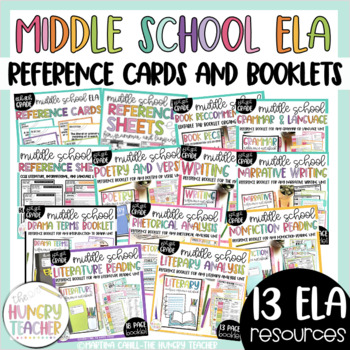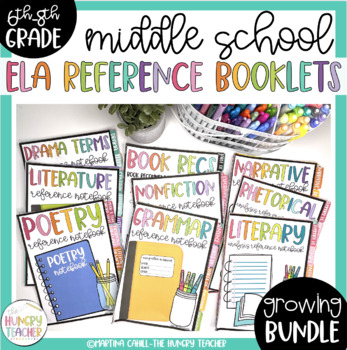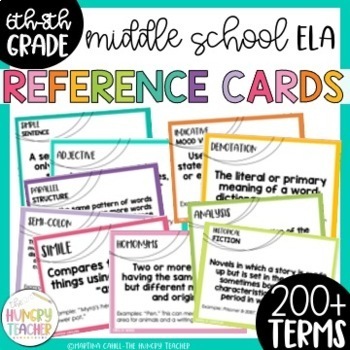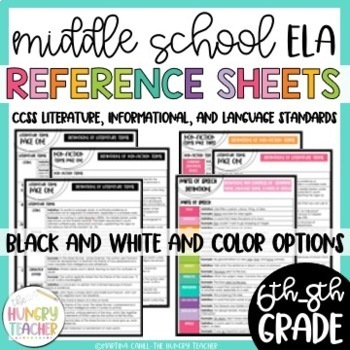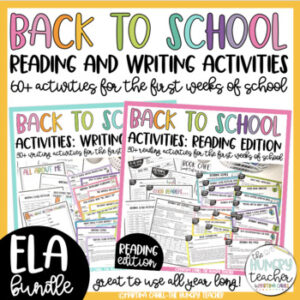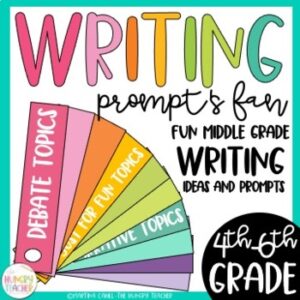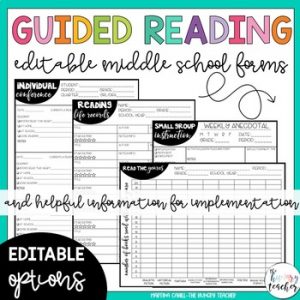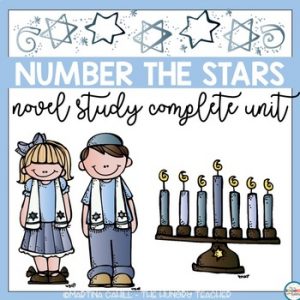Description
Download a preview <<HERE>>
These quick sheets, booklets, or reference pages can be quickly made into booklets, copies to glue into notebooks, or simply used as mini anchor charts for students to use all year long.
-
Middle School Book Recommendations Booklet
-
Middle School Writing Reference Pages and Booklet
-
Middle School Poetry Reference Pages and Booklet
-
Middle School Narrative Writing Reference Pages and Booklet
-
Middle School Literary Analysis Reference Pages and Booklet
-
Middle School Rhetorical Analysis Reference Pages and Booklet
-
Middle School Grammar Reference Pages and Booklet
-
Middle School Non-Fiction Reference Pages and Booklet
-
Middle School Literature Reference Pages and Booklet
-
Middle School Drama Terms Reference Pages and Booklet
-
Simple sentence
-
Compound sentence
-
Complex sentence
-
Compound-complex sentence
-
Declarative sentence
-
Imperative sentence
-
Exclamatory sentence
-
Interrogative sentence
-
Noun
-
Pronoun
-
Verb
-
Adverb
-
Adjective
-
Preposition
-
Conjunction
-
Interjection
-
Subordinating conjunction
-
Coordinating conjunction
-
Helping verbs
-
Linking verbs
-
Subjective pronoun
-
Objective pronoun
-
Possessive pronoun
-
Intensive pronoun
-
Reflexive pronoun
-
Vague pronoun
-
Coordinate adjectives
-
Article
-
Parallel structure
-
Subject
-
Predicate
-
Clause
-
Subordinating (dependent) clause
-
Independent clause
-
Misplaced modifier
-
Nuances
-
Exclamation point
-
Question mark
-
Parentheses
-
Quotation marks
-
Colon
-
Semi-colon
-
Apostrophe
-
Ellipses
-
Dash
-
Hyphen
-
Period
-
Comma
-
Simile
-
Metaphor
-
Hyperbole
-
Alliteration
-
Onomatopoeia
-
Personification
-
Idioms
-
Allusion
-
Adage
-
Homophones
-
Homonyms
-
Homographs
-
Synonyms
-
Antonyms
-
Denotation
-
Connotation
-
Indicative mood verb
-
Imperative mood verb
-
Interrogative mood verb
-
Conditional mood verb
-
Subordinate mood verb
-
Gerund verbal
-
Participle verbal
-
Infinitive verbal
-
Central Idea
-
Literature Terms
-
Literary Devices
-
Character Terms One
-
Character Terms Two
-
Types of Characters
-
Positive and Negative Character Traits
-
Types of Literary Conflict
-
Point of View One
-
Point of View Two
-
Author’s Purpose
-
Theme
-
Elements of Plot
-
Figurative Language One
-
Figurative Language Two
-
Reading Genres One
-
Reading Genres Two
-
Central Idea and Supporting Details
-
Author’s Purpose
-
Key Concepts: Key Ideas, Key Individuals, and Key Events using comparisons, analogies, categories, anecdotes, and illustrations
-
Nonfiction Text Structures: Compare and contrast, problem and solution, cause and effect, order and sequence and description
-
Nonfiction Text Features One
-
Nonfiction Text Features Two
-
Nonfiction Text Sections
-
Primary Sources
-
Secondary Sources
-
Rhetorical Appeals
-
Objective Summaries
-
General Nonfiction Terms
-
Mood and Tone
-
Figurative Language One
-
Figurative Language Two
-
Literary Devices One
-
Literary Devices Two
-
Types of Poems One
-
Types of Poems Two
-
Poetry Terms One
-
Poetry Terms Two
-
Six elements of quality narrative essays
-
Developing narrative plots
-
Examples of sensory details in narrative mentor texts
-
How and why to use dialogue in narrative essays
-
Ways to start a narrative
-
When to use transitions and lists of transition words or phrases
-
Pacing narrative stories
-
Ways to end a narrative
-
Editing vs. Revising
-
MLA Formatting of Essays
-
Summarizing vs. Analyzing
-
Elements of Literary Analysis
-
Annotating Literature
-
When Should I Annotate
-
Theme Statement and Theme Topics in Literature
-
Author’s Craft One
-
Author’s Craft Two
-
Symbolism
-
Thesis Statements
-
Linking Words in English
-
Editing Vs. Revising
-
MLA Formatting
-
Summarizing vs. Analyzing
-
Elements of Rhetorical Analysis
-
Author’s Purpose
-
Annotating Nonfiction
-
When Should I Annotate?
-
Rhetorical Appeals
-
Rhetorical Devices 1
-
Rhetorical Devices 2
-
Thesis Statements
-
Linking Words in English
-
Editing Vs. Revising
-
MLA Formatting
-
Drama Terms
-
Elements of Drama
-
Stage Directions
-
Character Types in Drama
-
Dialogue in Drama
-
Literary Conflict
-
Types of Drama
-
Point of View
-
Theme
-
Plot
-
Funny Book Recommendations (1 PAGE)
-
Fantasy Book Recommendations (1 PAGE)
-
Short, but Great Book Recommendations (1 PAGE)
-
Realistic Fiction Book Recommendations (2 PAGES)
-
Historical Fiction Book Recommendations (1 PAGE)
-
Award Winning Author Book Recommendations (2 PAGES)
-
Science Fiction or Dystopian Book Recommendations (1 PAGE)
-
Inspirational Book Recommendations (1 PAGE)
-
Books About Acceptance Recommendations (1 PAGE)
-
Books with Animals Recommendations (1 PAGE)
-
Books About Sports Recommendations (2 PAGES)
-
Books that are a Little Dark Recommendations
-
Books with Action Recommendations (1 PAGE)
-
Books Written in Verse Recommendations (2 PAGES)
-
Poetry Book Recommendations (1 PAGE)
-
Books that Girls Tend to Love Recommendations (1 PAGE)
-
Mystery Book Recommendations (2 PAGES)
-
Books in a Series or Trilogy Recommendations (2 PAGES)
-
Young Adult Recommendations (2 PAGES)
-
Young Love and Romance Book Recommendations (1 PAGE)
-
LGBQT Book Recommendations (1 PAGE)
-
Books that Address Mental Illness/Mental Health Recommendations (1 PAGE)
-
Classic Novel Book Recommendations (1 PAGE)
-
Non-Fiction Book Recommendations (2 PAGES)
-
Graphic Novel Book Recommendations (1 PAGE)
